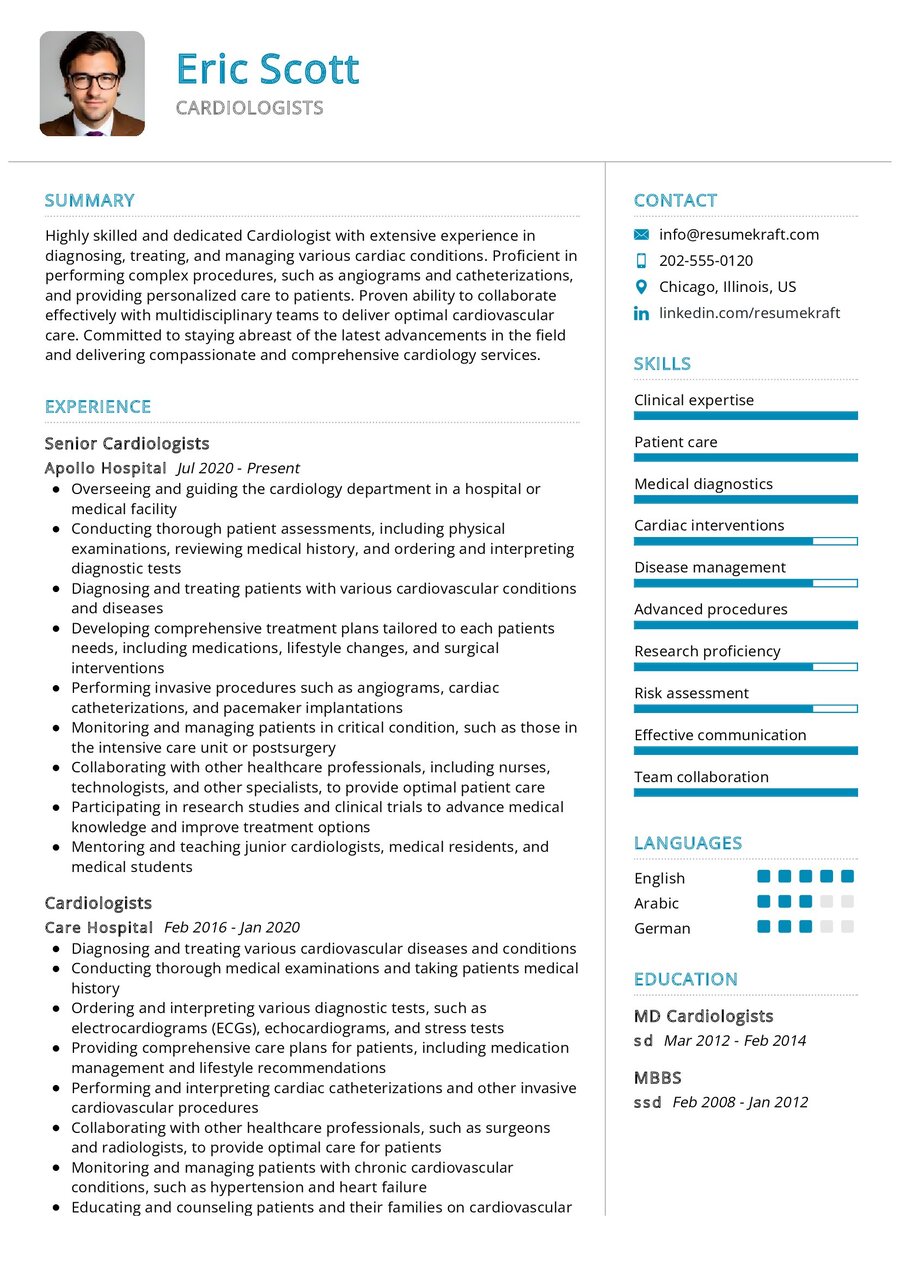Exploring the Role of Cardiologists in Modern Healthcare
Cardiologists play a vital role in the ever-evolving landscape of healthcare, serving as key players in the field of cardiovascular medicine. This article delves into the multifaceted responsibilities, job requirements, and skills essential for a successful career as a Cardiologist, highlighting the nuances of this critical role.
Cardiologist Job Requirements and Educational Background
Becoming a Cardiologist is a journey that demands a comprehensive educational background and a commitment to continuous learning. Here are the key requirements for aspiring Cardiologists:
- A Doctor of Medicine (MD) or Doctor of Osteopathic Medicine (DO) degree from an accredited medical school.
- Residency training in internal medicine, typically lasting three years.
- Fellowship in cardiology, focusing on the diagnosis and treatment of heart-related conditions.
- Board certification in cardiology, obtained through rigorous examinations.
- State licensure to practice medicine.
- Strong foundation in medical research and the ability to stay updated with advancements in cardiology.
Cardiologists undergo extensive education and training to ensure they are well-equipped to handle the complexities of cardiovascular healthcare.
Key Responsibilities of Cardiologists
The role of a Cardiologist encompasses a range of responsibilities aimed at diagnosing, treating, and preventing cardiovascular diseases. Let’s explore the core duties that define the day-to-day work of Cardiologists:
- Conducting patient consultations, medical examinations, and diagnostic tests to assess cardiovascular health.
- Interpreting test results and collaborating with other healthcare professionals to formulate treatment plans.
- Performing procedures such as angioplasty, stent placement, and cardiac catheterization to treat heart conditions.
- Providing guidance on lifestyle changes, medications, and other interventions to manage and prevent heart diseases.
- Monitoring patients’ progress and adjusting treatment plans accordingly.
- Participating in medical research to contribute to the advancement of cardiovascular science.
Cardiologists play a pivotal role in the holistic care of individuals with heart-related issues, combining medical expertise with compassion.
Skills Required for a Successful Career in Cardiology
Cardiologists need a diverse set of skills to excel in their roles. These skills encompass both technical expertise and personal attributes that contribute to effective patient care. Let’s categorize them into soft and hard skills:
Soft Skills:
- Empathy and effective communication, fostering a trusting relationship with patients.
- Team collaboration, working seamlessly with other healthcare professionals.
- Problem-solving abilities, crucial for diagnosing complex cardiovascular conditions.
- Attention to detail, ensuring accuracy in diagnostics and treatment plans.
- Adaptability, staying current with medical advancements and adjusting practices accordingly.
Hard Skills:
- Expertise in interpreting diagnostic tests, such as echocardiograms and stress tests.
- Proficiency in performing medical procedures like cardiac catheterization and angioplasty.
- In-depth knowledge of cardiovascular pharmacology for prescribing medications.
- Research skills, contributing to the scientific understanding of cardiovascular diseases.
- Analytical skills, interpreting complex medical data for accurate diagnosis.
Each skill is a tool in the Cardiologist’s toolkit, essential for delivering high-quality cardiovascular care.
Crafting a Comprehensive Cardiologist Resume
When creating a resume for a Cardiologist position, it’s essential to showcase both your educational background and practical experience. Here are some tips for an impactful Cardiologist resume:
- Highlight your academic achievements, including medical school honors and awards.
- Detail your residency and fellowship training, emphasizing relevant cardiology experiences.
- Showcase any research contributions, publications, or presentations in the field of cardiology.
- Include details of your clinical experience, specifying the range of cardiovascular conditions you’ve managed.
- Highlight any leadership roles or collaborations within medical teams.
Your resume is a professional snapshot that should demonstrate your qualifications and passion for cardiovascular medicine.
Sample Education Section for Your Cardiologist Resume
Your educational journey is the foundation of your career as a Cardiologist. Here’s how you can present your academic achievements:
- Doctor of Medicine (MD), Prestigious Medical School, Graduation Year.
- Cardiology Fellowship, Leading Cardiovascular Institute, Completion Year.
- Board Certification in Cardiology, Year of Certification.
- Bachelor of Science in Biology, University Name, Graduation Year.
Your education section should reflect your commitment to excellence and your journey towards becoming a proficient Cardiologist.
Common Mistakes to Avoid in a Cardiologist Resume
When crafting your Cardiologist resume, be cautious of common mistakes that could hinder your chances. Avoid the following pitfalls:
- Using generic language; tailor your resume to showcase your unique qualifications.
- Listing duties without highlighting specific achievements or patient outcomes.
- Overlooking the importance of a cover letter, which provides a personalized introduction.
- Using medical jargon excessively; ensure your resume is accessible to a broad audience.
- Neglecting proofreading; errors can diminish your professional image.
Steer clear of these mistakes to create a resume that stands out in the competitive field of cardiology.
Key Takeaways for Your Cardiologist Resume
As you tailor your resume for a Cardiologist position, keep these key points in mind:
- Emphasize your educational background and any specialized training in cardiology.
- Showcase your clinical experience and any leadership roles within medical teams.
- Highlight your research contributions and commitment to staying updated with medical advancements.
- Use clear and accessible language, avoiding excessive medical jargon.
Remember, your resume is a reflection of your dedication to cardiovascular healthcare, and it should resonate with potential employers seeking skilled and compassionate Cardiologists.
Finally, feel free to utilize resources like AI Resume Builder, Resume Design, Resume Samples, Resume Examples, Resume Skills, Resume Help, Resume Synonyms, and Job Responsibilities to create a standout application and prepare for the Cardiologist job interview questions.
Armed with these insights and tips, you are now ready to craft a resume that is a true reflection of your journey, your skills, and your commitment to excellence in the field of cardiology. Best of luck!


